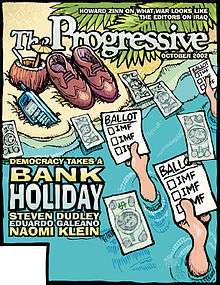Mike Flugennock

Mike Flugennock (born Michael Swartzbeçk[1]) is a left-leaning political cartoonist from Washington, D.C. He is best known for his political posters, which he and others paste across D.C. and in other cities around the country. His work has received coverage in the Washington Post on several occasions. He also did the cover art for the October 2002 edition of The Progressive magazine, as well as designed one of the event posters for the Operation Ceasefire events held on September 24, 2005. Flugennock was a member of the editorial board of DC Indymedia through April 2009.
His work is noted for its universal criticism of government figures, recent subjects of criticism have been both President George W. Bush and the Democratic Party; the former for his domestic and foreign policies, the latter for what he claims is its inability to provide a true, progressive alternative to the Republican party. During the Clinton era, most of his posters were critical of President Bill Clinton's military actions, and policies such as the North American Free Trade Agreement (NAFTA), the Communications Decency Act, and the Defense of Marriage Act. Since the 2006 mid-term elections, he has been more critical of the Democratic Party, particularly President Barack Obama and Secretary of State Hillary Clinton.
In addition to national politics, Flugennock is often critical of D.C. politicians, and he has made several posters criticizing Mayor Anthony Williams, whom he depicts as a rat. He is a noted critic of Charles Rangel and mocks him frequently in his cartoons, even going as far as to block Rangel's fan club on Twitter.
Flugennock's political cartoons have been featured in galleries[2] and various publications. His posters have appeared on the streets of Washington D.C., and other cities. Flugennock is the subject of a 2016 documentary titled Flugennock by Ron Douglas.
A Flugennock cartoon was submitted as an entry in the International Holocaust Cartoon Competition, a competition purportedly organized to test Western willingness to print Holocaust related cartoons in response to the Jyllands-Posten Muhammad cartoons controversy. While Flugennock did not personally submit his cartoon to the Iranian contest, he welcomes the controversy and is fine with many uses of his work, as long as credit is given.[3][4]
External links
- Mike Flugennock's homepage
- "Anthony Williams' Greatest Hits", poster series, March 2001.
- "The Poster Boy of Protest" Washington Post Article in PDF form
- "Meet A Local Cartoonist: A Chat With Mike Flugennock" in the DC CityPaper "Arts Desk", January 10, 2011